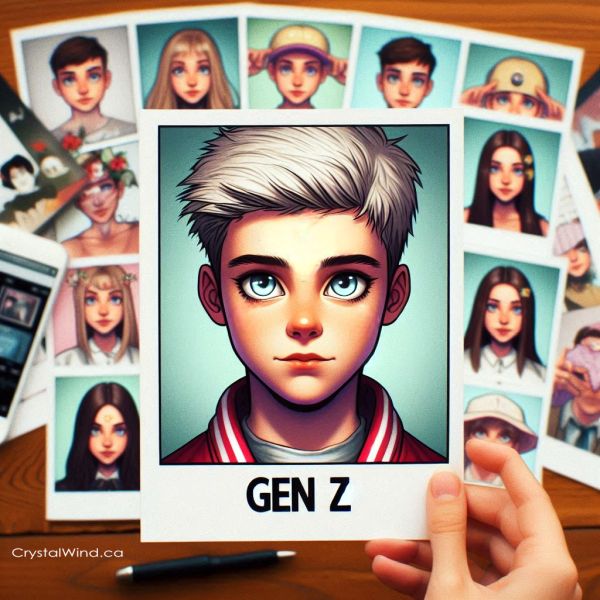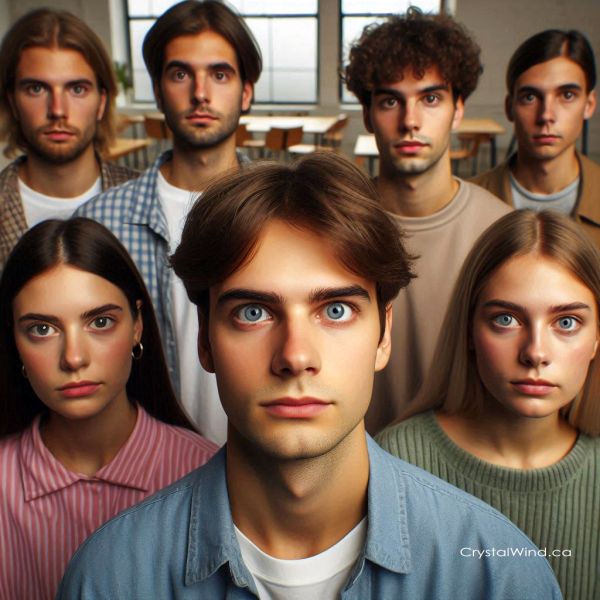Gen Z Stare: The Viral Trend Explained
- Details
- Written by AndEl
- Views: 7859

The Gen Z stare-a phenomenon that's swept across social media and real-life interactions-has rapidly become a defining, if enigmatic, feature of Generation Z's communication style.
Characterized by a blank, expressionless, and often unblinking gaze, the Gen Z stare is most visible in viral TikTok videos, retail encounters, and group selfies. This trend has drawn the attention of psychologists, cultural commentators, and workplace experts, all eager to understand what drives this unique form of nonverbal communication and what it reveals about the broader values and anxieties of Gen Z.
Origins and Cultural Context
The Gen Z stare is not just a quirky meme or fleeting trend. Its origins are layered, rooted in both the digital landscape Gen Z has grown up with and broader societal shifts. Unlike earlier generations who often smiled for the camera or practiced "customer service faces," Gen Z is more likely to present themselves online with a neutral or even bored expression. This look, described as "vacant" or "emotionless," is often used in response to questions or as a reaction to uncomfortable or awkward situations.
Experts trace the evolution of this stare to multiple influences. Social media is perhaps the most significant, with platforms like TikTok and Instagram rewarding both authenticity and irony. The stare is seen as a subtle rebellion against the hyper-positivity and performative enthusiasm that dominated millennial self-presentation online. Gen Z's digital fluency means they are highly attuned to inauthenticity and quick to reject anything that feels forced or "cringe."
Psychological and Social Underpinnings
Psychologists suggest that the Gen Z stare can signal a number of things, from social discomfort to self-protection. For some, it's a way to manage social anxiety or to create a buffer in overwhelming or ambiguous social situations. The pandemic, which forced millions of young people into isolation and digital-only interaction, has further intensified these tendencies. Many teens and young adults have become accustomed to communicating through screens, where facial expressions are often muted or exaggerated for effect.
In service and workplace settings, the stare often appears as a silent protest. When asked to do something they find unreasonable or when confronted with entitled customers, Gen Z workers may respond with a blank look instead of verbalizing frustration. Some experts interpret this as a negotiation tactic or even a subtle form of resistance to traditional workplace hierarchies. The message, as one TikTok creator put it, is, "The customer is not always right."

Digital Culture and the Value of Authenticity
Gen Z's relationship with digital culture is inseparable from the emergence of the stare. As the first generation to grow up entirely online, Gen Z is hyper-aware of the performance involved in digital self-presentation. Studies indicate that young people today face immense pressure to curate the "perfect" image on social media, which can result in anxiety, social comparison, and a lowered sense of self-worth. In response, Gen Z has developed a visual language that prizes authenticity and irony over polish and perfection.
The Gen Z stare, then, becomes a social signal-a way of saying, "I'm not faking it for you." Rather than masking discomfort or dissatisfaction with a smile, Gen Z chooses to display their true feelings, even if that means appearing bored or disengaged. This approach aligns with broader generational values: surveys show that authenticity ranks as one of the most important traits for Gen Z, both online and offline.
Broader Societal Shifts
Behind the blank stare lies a generation grappling with unique challenges. Gen Z faces record rates of anxiety, depression, and loneliness-trends that have only worsened in the digital age. The constant barrage of online content, fear of missing out (FOMO), and a culture of comparison can leave young people feeling overwhelmed and emotionally fatigued. The stare, for some, becomes a way to reclaim a sense of control or to opt out of exhausting social performances.
At the same time, Gen Z is known for its commitment to social causes, diversity, and inclusion. Their blank stare can also be interpreted as a refusal to "perform" for authority figures or to participate in systems they view as outdated or unjust. In this way, the stare is both a personal coping mechanism and a subtle act of cultural resistance.
The Gen Z Stare as Meme and Movement
Like many trends that begin online, the Gen Z stare has quickly become a meme, with countless videos and posts parodying or celebrating the expression. Some users employ the stare to mock awkward workplace interactions; others use it to signal solidarity with peers who feel similarly disaffected or misunderstood.
Yet, not everyone views the trend positively. Critics argue that the stare can signal disengagement or poor communication skills, potentially damaging workplace relationships or leading to misinterpretation. Others caution that while the stare may be an effective way to push back against unreasonable demands, it risks being seen as disrespectful or unprofessional if not used thoughtfully.
Conclusion
In the end, the Gen Z stare is far more than a passing TikTok trend or a punchline for older generations. It's a complex, multifaceted phenomenon that reflects deep shifts in how young people navigate identity, power, and authenticity in a hyperconnected world. Whether it's a shield against anxiety, a critique of performative culture, or a new form of digital body language, the stare is a powerful reminder that every generation finds innovative-and sometimes inscrutable-ways to express itself.
For further reading, consult The New York Times, Parents, Marie Claire Australia, and Medium for nuanced discussions on this phenomenon and its broader social implications.
And-El, a trailblazing entrepreneur and psychic empath, has secured millions for tech-spiritual ventures. With over 30 years of mysticism and telecom expertise, he founded CrystalWind.ca, a global spiritual hub since 2008. His 58-card Crystal Wind Oracle Myth & Magic Deck steadfastly guides seekers worldwide. Guided by Archangels, And-El’s startups kindle transformation with cosmic wisdom, nurturing a global community. Discover his enduring legacy at CrystalWind.ca #LightWarrior #SpiritualJourney #Awakening #CrystalHealing.
Liked this article? Dive deeper into personal growth and wellness! Check out CrystalWind.ca for spiritual wisdom or explore AromaWorx.ca for natural well-being tips. Spread the positivity—share this with friends on their happiness journey!
Let’s Chat! Drop Your Thoughts Below! ![]()
Latest Articles
Dive into the Mystical World of the Crystal Wind Oracle Deck!
Get All the Enchanting Details Now!
NEW Expanded Boxed Edition!
Now with 58 Cards for Richer Wisdom!

Imagine a world of inspiration and healing, free for all—made possible by YOU!
Donate Now—Ignite the Magic at CrystalWind.ca!

Epilepsy - Finding A Cure
Your donation can make a difference!
Help us find a cure – donate now!
Unlock Your Light: Join Lightworkers Worldwide on CrystalWind.ca!
Follow Us!
Featured This Month
Virgo Mythology
The Virgo Myth In all of constellation mythology, few legends are as misund... Read more
Sun in Virgo
An Overview of Sun Sign Characteristics for Virgo Virgo is guided by Mercur... Read more
Mabon Magic: Ideas For Fall Decoration And R…
Welcome (almost!) to Fall! We’re turning the Great Wheel once again, toward ... Read more
Mabon in Modern Times: Fresh Takes on the Au…
The Mabon season begins somewhere around the 21st-22nd of September and cont... Read more
Sweet Violet
Sweet Violet Faithfulness and modesty. “I will always be true to you.” Helps... Read more
Watermelon Tourmaline
Synonym: Rainbow Tourmaline The watermelon tourmaline is a rare variety t... Read more
The Vine: September 2nd - September 29th
The Autumnal Equinox ( Alban Elfed ) Celtic Symbol : The White Swan Read more
Crystals for Virgo
As the warmth of summer begins to soften into the crispness of autumn, the Sun... Read more
Peridot: The Healer's Stone
Peridot has been used as a Power Stone for centuries. Peridot fosters emotio... Read more














































